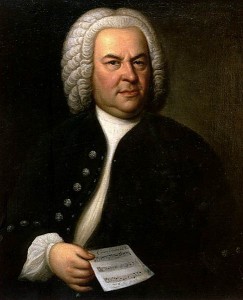 I was ready to turn off NPR this morning and begin work, when the familiar flute movement from Bach’s Orchestral Suite #2 tripped and bubbled from my radio speaker. I expected the announcer to cut in, the way announcers do during the transitional music between news stories, but the melody went on for what must have been a full twenty seconds. At length Bob Edwards introduced a story about the long-delayed restoration of Bach’s original manuscripts in Leipzig. The manuscripts had lain off-limits in the German National Library in Berlin for decades, with not even basic efforts attempted at preservation. But now, with the fragile papers near a state of complete disintergration, a team is finally hard at work preserving them for future study.
I was ready to turn off NPR this morning and begin work, when the familiar flute movement from Bach’s Orchestral Suite #2 tripped and bubbled from my radio speaker. I expected the announcer to cut in, the way announcers do during the transitional music between news stories, but the melody went on for what must have been a full twenty seconds. At length Bob Edwards introduced a story about the long-delayed restoration of Bach’s original manuscripts in Leipzig. The manuscripts had lain off-limits in the German National Library in Berlin for decades, with not even basic efforts attempted at preservation. But now, with the fragile papers near a state of complete disintergration, a team is finally hard at work preserving them for future study.
According to the report, one of the tasks in which the restoration team at the Bach Library in Leipzig is engaged is to digitally photograph every one of the manuscript pages and make them available online for music historians all over the world to study. The museum official commented on the quality of the digital images, their level of detail, and the information that the erasures, word transpositions, and margin notes could provide to those looking to reconstruct the life and creative mind of Bach.
It was a story near and dear to my heart, as I love Bach — especially his sacred works. And, like old J. S., I’m a Lutheran Christian, so for the most part I “get” (inasmuch as anyone can get what’s in the mind of a genius!) the explicit and implicit theology he was trying to convey in his music.
Reporter Emily Harris closed the story by noting that there were some questions which only hands-on work with the originals could answer, such as analysing the paper and ink of the manuscripts themselves to determine not only the age of the works in time, but in relation to each other.
And in fact, she said, the researchers had already made one significant discovery using these same methods. The last work Bach ever wrote was not, as had long been supposed, the Art of the Fugue, a work for solo keyboard, but his Mass in B minor — a stupefying, full-blown paean to God’s grace and glory, scored for orchestra, chorus and soloists.
Harris added that the reason that Bach labored to finish this work before his death “might yet be found in an archive — a commission, for example. Or it might rest with the composer — and the listener…” and the titanic, joyous, tympani-and-burnished-brass opening of the “Gloria” from his Mass filled my kitchen.
Bach was nearly blind in his final years, and many had often wondered how he had managed to write the structurally complex, spare, almost ascetic Art of the Fugue under such conditions. So, the revelation that the completed Mass was actually his last work makes more sense musically, given its melodic antecedents in Bach’s earlier compositions. The impetus for the work had originated decades before his death, when he had first composed the “Kyrie” and “Gloria” as an audition piece for a royal appointment.
But this revelation about the finished composition — and the mental picture of Bach, old, sightless, ailing, worn out from years of continuous service to his Lord, struggling to put the finishing touches on this, his final work before going to his reward — freed it once and for all for me from its supposed pragmatic origins as a resume piece, and sent it soaring heavenward. I stood in my kitchen this rain-washed morning, after hearing news of war and government mendacity and economic recession and all manner of sorrows, and cried as I heard the familiar text ringing out. “Glory to God in the highest, and on earth peace to men of good will….”
I’ve sung the Mass in B minor in its sublime entirety three times; twice as an alto and later, after years of voice lessons, as a soprano. Emily Harris was correct. I will never hear it the same way again.
No comments yet